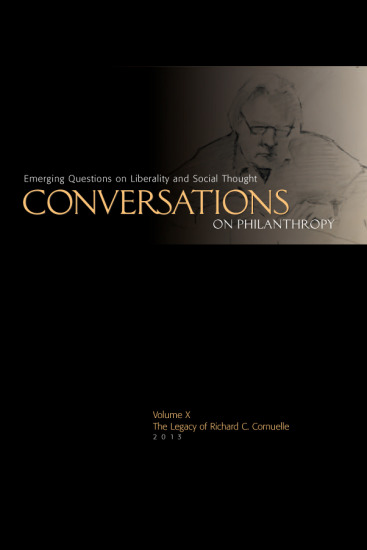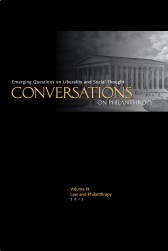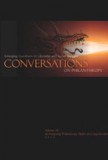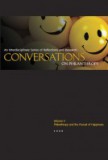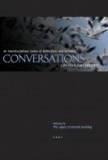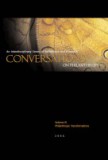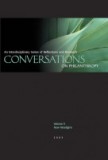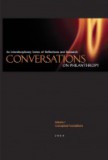Interested in learning more? Subscribe to our mailing list.
Conversations on Philanthropy is an annual publication of The Philanthropic Enterprise. Seeking to ignite reflection and discussion on the role of beneficence in the social order, Conversations features academic papers, essays, and reviews by scholars, philanthropists, and social entrepreneurs
Volume X - The Legacy of Richard C. Cornuelle, 2013-14
Introduction ![]() [+]
[+]
Richard Cornuelle died on April 26, 2011 at the age of 84. In the essays and book reviews presented in this tenth volume of Conversations on Philanthropy—the journal Dick and I cofounded in 2004 to engage new intellectual companions in our quest to understand how a free society, properly understood, might be the most humane society, properly understood—you will learn more about Dick’s life’s work on behalf of his unique vision of a good society. Here I shall simply try to pay tribute to a mentor and friend whom I continue to miss. Read More...
PETER J. BOETTKE is University Professor of Economics & Philosophy at George Mason University, and the Director of the F. A. Hayek Program for Advanced Study in Philosophy, Politics and Economics at the Mercatus Center. His most recent book is Living Economics (2012) which discusses the teaching and practice of economics and political economy. He is the co-editor of the Review of Austrian Economics.
DAVID ELLERMAN works in the fields of economics and political economy, social theory and philosophy, and in mathematics. He is a visiting scholar at the University of California in Riverside, and has published numerous articles in various fields and five books, including Helping People Help Themselves (2006).
ROBERT F. GARNETT, JR. is Professor of Economics at Texas Christian University. His current work examines the goals and methods of liberal learning in undergraduate economics education, the virtues of pluralism in economic inquiry, and the relationship between commercial and philanthropic forms of economic cooperation.
HEATHER WOOD ION is founder of the nonprofit Epidemic of Health and also currently manages Athena Charitable Trust. A cultural anthropologist who holds dual degrees from Oxford University, Ion has specialized in turning around troubled organizations.
ROGER A. LOHMANN is an Emeritus Professor at West Virginia University. His latest book, New Commons and Voluntary Action, an extensive update of his theoretical work on the commons theory of voluntary action, was self-published this year. It builds on Cornuelle’s notion of an independent third sector.
JOHN MCCLAUGHRY founded the Institute for Liberty and Community in 1973. He has served as a member of the Vermont House and Senate, and for 46 years as the town meeting Moderator of the town of Kirby.
WILLIAM A. SCHAMBRA is the director of the Hudson Institute's Bradley Center for Philanthropy and Civic Renewal. He has written extensively on the Constitution, the theory and practice of civic revitalization, and civil society in various publications and is the editor of several volumes.
PAOLA SAUREZ is the Richard Cornuelle Fellow at the F. A. Hayek Program for Advanced Study in Philosophy, Politics, and Economics at the Mercatus Center and a PhD student in the Department of Economics at George Mason University.
FREDERICK TURNER is the Founders Professor of Arts and Humanities at The University of Texas at Dallas. He is the author of thirty books of poetry, criticism, translations, and fiction.
Essays
From Big State and Small Society, to Small State and Big Society: Reflections on Richard Cornuelle's Healing America ![]() [+]
[+]
--Peter J. Boettke and Paola A. Suarez
Society performs for itself almost everything which is ascribed to government. . . .
So far is it from being true, as has been pretended, that the abolition of any formal government is the dissolution of society, that it acts by a contrary impulse, and brings the latter the closer together. All that part of its organisation which it had committed to its government, devolves again upon itself, and acts through its medium. When men, as well from natural instinct as from reciprocal benefits, have habituated themselves to social and civilised life, there is always enough of its principles in practice to carry them through any changes they may find necessary or convenient to make in their government. In short, man is so naturally a creature of society that it is almost impossible to put him out of it... Read more...
Midwestern Liberal: A Smithian "Reclaiming of the American Dream" ![]() [+]
[+]
--Robert F. Garnett, Jr.
At my first Philanthropic Enterprise colloquium in 2004, we explored the work of economist Kenneth Boulding. Lenore Ealy also invited us to read (if we hadn’t already) Richard Cornuelle’s Reclaiming the American Dream. The conversation never put Boulding and Cornuelle side by side, yet I was struck by several similarities: (1) the nature and timing of their respective efforts to integrate benefaction (what Cornuelle called the service motive) into economic theory (Boulding 1962, 1965; Cornuelle 1993 [1965]); (2) their tripartite conceptions of modern society: Boulding’s exchange, threat, and integration systems (1963) and Cornuelle’s commercial, governmental, and independent sectors (1993 [1965]); and (3) their shared desire to “find an alternative path to the good society other than those of the doctrinaire conservatives or the dogmatic liberals of the Cold War era” (Ealy 2002, 2; see also Cornuelle 1993 [1965], 3-19; Boulding 1981, 112). Read more...
Consequentialism and Philanthropy: The Legacy of a Revolutionary![]() [+]
[+]
--Heather Wood Ion
Early in De-Managing America, Richard Cornuelle raises the questions of how life in America really works, what we know about it, and how we can make it better. He expresses his admiration for the resilience of people, and makes clear his desire to confront myths he previously accepted as truth. Then he writes, “And in the process, I came to believe completely in the indomitability of the human spirit. I feel a powerful force pushing us inexorably toward a good society—the steady urgent pressure of men and women straining to be human, to discover and express all the things they can be. And although I can’t prove it, I believe the things straining for fuller expression are good things—warmth, understanding, loving-kindness, creativity, laughter” (1975, 6).
As we explore Cornuelle’s books and papers, we are reminded repeatedly of this optimism, of this sense of a powerful force pushing us toward the good society through what is good in individuals. If we examine Cornuelle’s wrestling with the practical applications of optimism, we better understand that he was interested in consequences, in what we are creating in our work together. This legacy shows his struggle against ideologies, orthodoxies, and labels; he wants to engage citizens in actions that transcend the particular alignments of parties or factions and which transform the structures and systems he found so stultifying. His thinking about generosity, about human potential, and about the future revolves around shared benefit. Only insofar as the term invited exploration would he have accepted a label which included an “ism.” This essay is an attempt to trace the evolution of the work around social change which Cornuelle viewed as revolutionary. Read more...
(Re)Considering the Independent Sector ![]() [+]
[+]
--Roger A. Lohmann
Richard Cornuelle’s Reclaiming the American Dream: The Role of Private Individuals and Voluntary Associations has been subjected to numerous interpretations in the more than half a century since its original publication in 1965. For many readers familiar with the book, Reclaiming the American Dream may now seem old news—nearly sixty years have passed since its first printing, it references current events from the Kennedy and Johnson years long since past, and it seems, at first glance, to be merely a forerunner argument for more recent, up-to-date formulations of the American nonprofit sector. Nonetheless, with Cornuelle’s death in 2011, it is essential that we remind ourselves of the importance of this most enduring idea and ideal. Read more...
Richard Cornuelle's Quest for Community: Reflections on "De-Nationalizing Community" ![]() [+]
[+]
--William Schambra
For a man whose obituaries almost universally and exclusively affixed to him the label “libertarian,” it may be surprising to hear that Richard Cornuelle described himself, in his presentation to the Philanthropy Roundtable entitled “De-Nationalizing Community,” as a “closet communitarian for most of my life.” He even claimed to have been “honored recently when a libertarian critic included me in his denunciation of Amitai,” referring to his fellow panelist Amitai Etzioni, the liberal sociologist widely acclaimed as the founding theorist of modern communitarianism (1996, 10). Read more...
Government Versus Community: Reflections on Cornuelle's "De-Nationalizing Community"![]() [+]
[+]
--John McClaughry
In Reclaiming the American Dream (1993 [1965]), the work that first brought him to national attention, Richard Cornuelle introduced the term independent sector into the lexicon. This sector—not business, not government––Cornuelle saw as the voluntary, people-centric mechanism for reclaiming the American dream.
As Cornuelle ruefully noted, however, the independent sector’s multifarious participants were not organized beyond their local sphere of operations, lacked a conscious sense of identity, and had little appreciation of the potential of their sector to ameliorate the problems faced by late twentieth-century America. Worse yet, he noted, the independent sector “is unreliable; it performs unevenly; its brilliant achievements stand in contrast to miserable failures, it often exhibits a stubborn backwardness” (1993 [1965], 45). Cornuelle’s goal, of course, was to give identity, momentum, and prestige to this large, but little-noticed, sector. Read more...
New Work for the Visible Hands of Business ![]() [+]
[+]
--David Ellerman
Perhaps the abiding theme of Richard Cornuelle's thought was libertarian skepticism about the efficacy of government in addressing social problems. But what is the best nongovernmental means to address these problems? Cornuelle was far from the sort of libertarian who glorified the individual and saw appeals to community and society as creeping socialism. And it was in this quest for community that he saw the independent sector as the best hope for "reclaiming the American dream" (1965). It was a vision of the independent sector more as community-based little platoons and Tocquevillean associations than as large, bureaucratized nonprofits vying for government grants to "implement social programs."
It is safe to say that Cornuelle's vision of the independent sector has not been realized. What part of his vision needs to be rethought? Cornuelle's 1991 “New Work for Invisible Hands” shows at least one direction for that rethinking. My goal here is to indicate one way in which the rethinking initiated in that article could be carried further. Read more...
Better and Worser Angels, and their Invisible Hands ![]() [+]
[+]
--Frederick Turner
In his essay “New Work for Invisible Hands” Richard Cornuelle evokes Adam Smith’s metaphor of the invisible hand, but challenges us to consider it in terms of our communal rather than our commercial activities. Adam Smith’s “invisible hand” is invisible for two reasons. One, of course, is that as a collective, gradual, and multitudinous process of what we would now call distributed computation, it would necessarily be imperceptible as a whole to its participants, and its results in terms of pricing would seem almost miraculous. When the stock market rises and falls, the language we use to describe it is not unlike the way the Greeks described the apparently arbitrary and unpredictable behavior of the gods, who were naturally invisible to humans except when they revealed themselves to the occasional hero or attractive princess. The market, like the god Mercury from which it gets its name, works in its mysterious way its wonders to perform. Read more...
Book Review Retrospective
Reclaiming the American Dream 
Reviews by:
M. Stanton Evans (1965)
Edwin J. Feulner, Jr. (1966)
Lowell Mason (1966)
John Chamberlain (1994)
De-Managing America 
Reviews by:
David G. Santry (1975)
John Chamberlain (1976)
Felician F. Foltman (1976)
Healing America 
Reviews by:
John Chamberlain (1983)
Richard M. Ebeling (1984)

